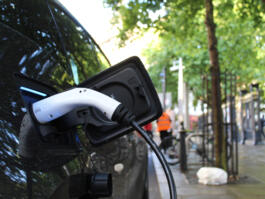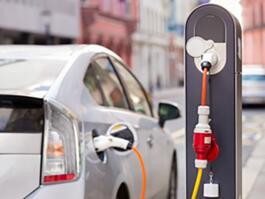Electrify the Roads
A Commentary By Froma Harrop
My magic wand is on the fritz, otherwise we'd have a big, new federal program to free America from its dependence on oil. Like other environmentalists, I'm sad that the calamity in the Gulf of Mexico hasn't spurred Washington to more vigorously promote America's exit from thiscurse.
The fault may lie with President Obama's timidity, a public scared by major new government programs or fossil-fuel interests flashing their campaign dough. Probably it's all three, but the bottom line is this: An all-out effort to unchain America from hydrocarbons is essential to national security, a healthy environment and economic prosperity in the 21st century. But it's not politically possible.
And so we must look at what's passable. Fortunately, there's one piece to the escape strategy that business leaders, military brass and the buying public all like -- and would create jobs. Most importantly, it has bipartisan support in Congress.
We speak of electric cars, specifically the "Electric Vehicle Deployment Act of 2010." Sponsored by Sens. Byron Dorgan, D-N.D., Lamar Alexander, R-Tenn., and Jeff Merkley, D-Ore., the bill's goal is to electrify half of America's cars and trucks within 20 years. That, its backers say, would cut America's dependence on petroleum by a third. Similar legislation is before the House.
The Senate bill would name at least five communities to be modelsfor electric-vehicle transportation. They would build stations wheremotorists could recharge their cars' batteries. Residents would be offered a $10,000 tax credit to buy electric cars. And the federal government would put $1.5 billion into research for improving electric-car technology.
Electric cars don't appear to be a very hard sell to those who would buy them. The first all-electric model, the Nissan Leaf, will hit the U.S. market at the end of the year. (The batteries will be made in Smyrna, Tenn.) But you won't be able to just pick one up, because the year's production is already sold out. More than two-thirds of the 19,000 preorders are from the United States.
The Chevy Volt will reach showrooms around that time. Its battery range of 40 miles is considerably smaller than the Nissan Leaf's 100 miles, but the Volt has a small gasoline engine to keep the car going if a recharging station is not handy.
In any case, more than 75 percent of Americans commute 40 miles or less a day. That means most of them could plug in their Volts at the end of the day and drive off fully charged in the morning.
Being both an environmentalist and a fan of high automotive performance can be awkward. But car makers are learning to put zoom into their fuel-efficient models. The Ford Fusion Hybrid, for example, gets 41 miles-a-gallon in the city, but can pull away from a stoplight at a respectable pace. "Sustainable mobility solutions" need not be as boring as they sound.
What about the source of the electric power? Although an all-electric vehicle puts out zero emissions, that is probably not true of the plant that provides the electricity. While California has moved its mix of electricity sources toward clean, renewable energy, other parts of America are still highly dependent on dirty, coal-powered plants.
However, electric cars cut global warming pollution even where coal supplies the power, according to a study by the Pacific Northwest National Laboratory in Richland, Wash. That's because cars plugged in overnight employ unused capacity in the current electric system.
So let the brawl over cap-and-trade proceed. Outside of the oil business, most everyone seems enthusiastic about accelerating a move toward electric cars. Nothing should stop Congress from revving up the process.
Right?
COPYRIGHT 2010 THE PROVIDENCE JOURNAL CO.
DISTRIBUTED BY CREATORS.COM
See Other Political Commentary.
See Other Commentaries by Froma Harrop .
Views expressed in this column are those of the author, not those of Rasmussen Reports.
Rasmussen Reports is a media company specializing in the collection, publication and distribution of public opinion information.
We conduct public opinion polls on a variety of topics to inform our audience on events in the news and other topics of interest. To ensure editorial control and independence, we pay for the polls ourselves and generate revenue through the sale of subscriptions, sponsorships, and advertising. Nightly polling on politics, business and lifestyle topics provides the content to update the Rasmussen Reports web site many times each day. If it's in the news, it's in our polls. Additionally, the data drives a daily update newsletter and various media outlets across the country.
Some information, including the Rasmussen Reports daily Presidential Tracking Poll and commentaries are available for free to the general public. Subscriptions are available for $4.95 a month or 34.95 a year that provide subscribers with exclusive access to more than 20 stories per week on upcoming elections, consumer confidence, and issues that affect us all. For those who are really into the numbers, Platinum Members can review demographic crosstabs and a full history of our data.
To learn more about our methodology, click here.



